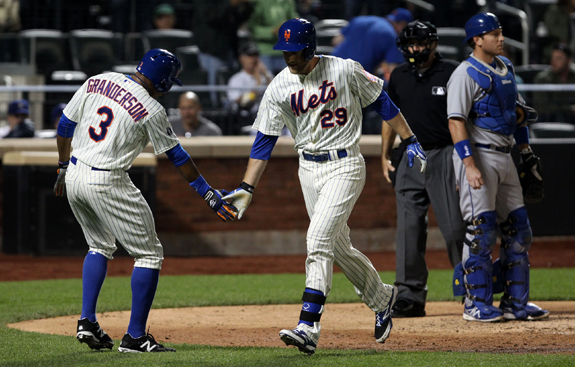Judging from comments on my twitter feed, I’d venture to guess that the prevailing emotion among Mets fans out there for this season is abject frustration. While there are times when we are offered glimmers of hope and slivers of consistency, they tend to be quickly snuffed out. The team itself is probably more likeable than it has been in a while, but the constant RISP and LOB trends tend to put a proverbial damper on these good feelings like a wet wool blanket tossed on uncle Jimmy after his little bbq accident at the 4th Of July get together. We’re left with that nasty smell of burnt forearm hair and losses that should have been wins.
I can’t remember a season so full of “could have beens.” I honestly believe we might have easily been 8 or 10 wins up in the win column if only we’d had a few things break our way, if only we had a few more clutch hits. The Mets, post 2006, have been plagued with the worst label you can have as a team, they are perceived as unclutch. More recently they seem capable of pitching well enough, they’ve repaired a chronically leaky pen, but the team as a whole continues to struggle with scoring runs in high leverage situations. Is this apparent perception borne out statistically?
The world of sabermetrics seems to put out a new stat every week, and each one more complex than the last. I actually read an article a couple of days ago that asked you to refer back to first year calculus, that’s like asking me to refer back to my time in the birth canal. There are some things I’d rather not remember. There is actually a stat now called “clutch.” Clutch = (WPA / pLI) – WPA/LI. It is a measure loosely based on something called sequencing and “performance bunching.” In a nutshell, clutch measures a team’s ability to group fortuitous events together with productive results.
Take the Nats series for instance, the Mets left a bunch of runners on base, and inning after inning seemed to string hits together only after getting two outs, which resulted in being repeatedly turned away without scoring — they had a clutch score of -0.07 (0 = average). The Mets, ostensibly, appear to be extremely unclutch, however, when you take a closer look, the numbers don’t exactly bear this out. They have a whopping -44 rdif and according to fangraphs, offensively are the tenth most “clutch” team in baseball with a rating of -0.20. Are you kidding me?
Mets hitters are actually more “clutch” than the Nationals (the Nats have a clutch rating of -0.44) … Why?? I don’t know … THIRD BASE! But before I add another “and I don’t give a damn,” Lou Costelloism, I should mention that given what the Mets have accomplished statistically, they have won more games than they should have. Wonderful, so the Mets are actually pretty clutch given how bad they are. That makes about as much sense as saying a pig can fly fairly well considering he’s a pig … but I get it.
This my friends is why we may be stuck with Terry Collins. The numbers gurus are quick to dump out buckets of stats showing that given what the Mets have produced, they’ve actually won more games than they should have. Right now the most clutch teams in baseball are the Royals, the Orioles, the Red Sox (really?), the Yankees, and the Braves, the least clutch teams are the Twins, the Rockies, the Angels, the Rays, and the Cubs. The Mets currently have a .471 winning percentage, however, BaseRuns a statistic that strips away variation from performance and tells you in a sense what a team should have done were it not for sequencing and “clutch events,” says the Mets should have a .458 winning percentage.
Statisticians are also quick to point out that clutch is meaningless, primarily due to the inordinately high probability of regression. According to their theory, the Giants were never really better than the Dodgers, they have simply been extremely clutch, similarly they cite the Orioles and the Royals as examples of teams that are currently running ahead of their competition contrary to actual on field performance … again mostly because they’ve been lucky enough to group or sequence productive events (they’ve been clutch). Regression, however, is unavoidable. Jeff Sullivan of fangraphs recently showed in convincing detail that there is no such thing as clutch … clutch is simply a grouping of productive events that happens to coincide with high leverage situations, it is random and thus highly vulnerable to regression. Which means the Mets, given their production, may end up losing at an even higher rate than they have thus far.
Now I am not familiar enough with what goes into these statistics to comment on whether clutch performances are anomalies on a team level and whether regression is inevitable. If it is then the Royals will not win their division and the Rays will make a run at some point, but some teams, the Orioles and Giants come to mind, appear to be consistently “clutch” which runs contrary to league regression trends. There are outlying examples of teams that do not regress. In these instances there may be opportunities for determining whether there are in fact occasional examples of teams that have been for whatever reason capable of bunching improbable productive events together consistently. We saw this first hand with the Giants. An error here, a passed ball there, and poof, they snatch a win from the jaws of defeat. Maybe clutch has something to do with not being bright enough to be nervous in a situation where you should be nervous … Hunter Pence, that poor man’s wanna-be Brandon Nimmo, comes to mind. Who knows. I sure don’t.
If I had to guess I would say that clutch hitting does not correspond accordingly with clutch pitching, if it did I’m sure the Nats with their 17 WAR for pitching would have a higher overall clutch rating. While the Mets have failed to produce on par with a .471 winning percentage, their pitching has been stifling at times and I think clutch pitching performances are more difficult to qualify than clutch hitting performances because of all the myriad situational nuances that go into a pitcher’s mound presence and execution. Tom Seaver by most accounts would be considered a clutch pitcher, but he was also really really good. I would wager the 1969 Mets were an extremely clutch team if you go off of their production, but I’d also wager the teams who faced the Mets down the stretch and in the playoffs in 1969 didn’t think clutchness had anything to do with it … they simply overwhelmed you with pitching.
What worries me in light of all this is that our current front office’s adherence to sabermetrics dictates that the team is performing above it’s capabilities, which would imply their coaching staff and manager are doing a great job. The problem with this approach is it is an after the fact analysis. The Mets have not produced but have somehow won more than they should have given their production … unfortunately one of the reasons they’ve failed to produce is a problematic roster and an even more problematic allocation of playing time from said roster. It is akin to a baker using the wrong ingredients in a cake that ends up tasting terrible and giving him a pass because, well it isn’t fair to expect a cake with the wrong ingredients to taste good.














